|
|
|
Sort Order |
|
|
|
Items / Page
|
|
|
|
|
|
|
| Srl | Item |
| 1 |
ID:
073146
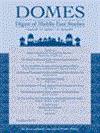

|
|
|
|
|
| Publication |
Hampshire, Ashgate, 2006.
|
| Description |
xvi, 234p.hbk
|
| Standard Number |
0754644812
|
|
|
|
|
|
|
|
|
|
|
|
Copies: C:1/I:0,R:0,Q:0
Circulation
| Accession# | Call# | Current Location | Status | Policy | Location |
| 051501 | 973.931/HUN 051501 | Main | On Shelf | General | |
|
|
|
|
| 2 |
ID:
120478
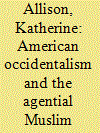

|
|
|
|
|
| Publication |
2013.
|
| Summary/Abstract |
Through the War on Terror the United States developed a seemingly enlightened understanding of Muslim women. In contrast to Orientalised representations of Muslim women's passivity and victimisation within brutal Islamic cultures these emerging representations posit Muslim women in terms of their modernity and liberation. The emergence of this new Muslim woman illuminates an attempt to secure an Occidental self through the negotiation of conflicting impulses towards Islam. Islam is recognised as the repository from which the US enemy other emerges yet the WoT also reflects a particular desire for a cosmopolitan inclusivity. The presence of the Muslim woman acts to assuage these tensions. Her oppression confirms the barbarity of the enemy yet the combination of her intrinsic agency and religiosity posits her as an acceptable Islamic other whose presence confirms the pluralistic tolerance of the US and the universal validity of its project.
|
|
|
|
|
|
|
|
|
|
|
|
|
|
|
|
| 3 |
ID:
134818
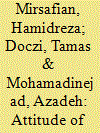

|
|
|
|
|
| Summary/Abstract |
Women's sport has always been a challenging subject in Muslim countries and Muslim women have had to face various constraints regarding their participation in sport and exercise, which also influence their attitudes to sport. This study aims to explore the attitude of Iranian female university students toward sport by survey method (N = 1,120) and qualitative interviews (N = 50). The results indicate that the majority of the participants have negative attitudes to sport, and accordingly they do not practice it. Various macro-, meso- and micro-level factors were found as perceived barriers. From the results it can be concluded that the media as a tool for raising awareness to providing role models and shaping the social values of mainstream society does not take a positive role in order to develop the culture of women's sport, and to change the attitude of female students and their social environments to sport in Iranian society.
|
|
|
|
|
|
|
|
|
|
|
|
|
|
|
|
| 4 |
ID:
148977
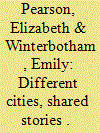

|
|
|
|
|
| Summary/Abstract |
In 2015, UN Security Council Resolution 2242 advocated deliberate outreach to women when devising counterterrorism projects. This is based on assumptions of the need to empower women, as well as their particular ability to exert benign influence over young people and stop radicalisation to violence. The approach has been particularly prevalent in Western Countering Violent Extremism (CVE) projects aimed at preventing homegrown Islamist radicalisation. On the basis of fieldwork with Muslim communities in five countries – Canada, the UK, Germany, France and The Netherlands – Emily Winterbotham and Elizabeth Pearson challenge the underlying assumptions of such an approach, and suggest aspects of women’s CVE projects may exacerbate existing community tensions, and do not reflect the changing norms of Muslim communities in the West. Alternative modes of engagement could improve the efficacy of CVE and enable it to better appeal to those it is intended to help.
|
|
|
|
|
|
|
|
|
|
|
|
|
|
|
|
| 5 |
ID:
112171
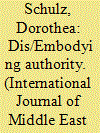

|
|
|
|
|
| Publication |
2012.
|
| Summary/Abstract |
This article explores how the introduction of sound reproduction technologies inflects what were previously considered authoritative, standardized, and gender-specific forms of religious leadership and how these changes affect in turn the (gendered) subjects of media practice. Examining the recent, controversial public presence of female radio preachers in Mali, the article elucidates the often ambivalent reactions to their radio-mediated dissociation of voice and physical presence, ambivalences that are expressed in the form of gender-specific evaluations of the acceptability of preaching on radio. The article thus argues that analyses of the controversial position of Muslim women in religious debates might benefit from a close scrutiny of the media technologies that enable these women's public mediation and also from paying sustained attention to cultural constructions of the voice as a medium of transmitting religious knowledge.
|
|
|
|
|
|
|
|
|
|
|
|
|
|
|
|
| 6 |
ID:
099548
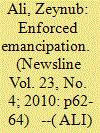

|
|
|
| 7 |
ID:
187072
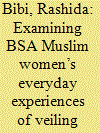

|
|
|
|
|
| Summary/Abstract |
In The Souls of Black Folk W.E.B Du Bois conceptualised arguably two of the most significant and powerful theories of race and racism, that of ‘the Veil’ and ‘double consciousness’. This paper utilises the concept of the veil both literally, in the case of non/veiling acts of British South Asian (BSA) Muslim women living in Oldham, but also metaphorically, through the Veil, as a form of social and cultural exclusion of Muslim women in everyday interactions. The paper argues that the use of the Veil and double consciousness, is able to highlight the extent to which Muslim women actively reflect upon hegemonic discourses of the veil as oppression and veil as respectability which shape understandings of them. The paper contends that an analytical use of ‘double consciousness’ in particular, can highlight the nuanced experiences of BSA Muslim women’s everyday lives.
|
|
|
|
|
|
|
|
|
|
|
|
|
|
|
|
| 8 |
ID:
076636
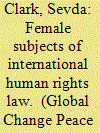

|
|
|
| 9 |
ID:
106539
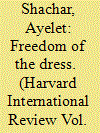

|
|
|
| 10 |
ID:
093354
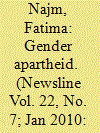

|
|
|
| 11 |
ID:
160376
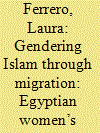

|
|
|
|
|
| Summary/Abstract |
Italy is the first European arrival country for many Egyptian migrants. A first wave of Egyptian male migrants in Italy was followed by a family reunification phase, with the result that the number of Egyptian women increased in the last decades. Studies of their diasporic experience, nonetheless, are still rare. In particular, analysis of women’s relationship with Islam is needed. Building on the anthropological work which has recently showed how the everyday constitutes a useful analytical category in relation to Islam, the aim of this article is to describe and analyse women’s activities in a mosque in Turin during the years 2011–13. I argue that the role of religious spaces in the context of emigration goes beyond the religious sphere, and women’s participation should therefore be understood from a dual perspective: religious and spiritual, on the one hand, and social and cultural, on the other. The description of women’s everyday practices in religious space allows for a reflection on how migration shapes new Islamic identities that are co-constituted with morality, secularism and displacement. The article contributes to the debate on ‘everyday Islam’ by showing that the effects of migration on the religious experience, far from being homogeneous, can encompass both normativity and resistance.
|
|
|
|
|
|
|
|
|
|
|
|
|
|
|
|
| 12 |
ID:
185582
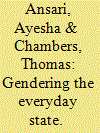

|
|
|
|
|
| Summary/Abstract |
This ethnographic article focuses on interactions between poor Muslim women, various intermediaries/brokers, and the Indian state. The article illustrates the complexities of claim-making and the forms of subjugation/marginalisation Muslim women experience when attempting to access resources, documents or paperwork. Contrary, however, to many representations of Muslim women’s engagements with the state, we also draw out agentive aspects as women hustle and negotiate to make claims and assert citizenship rights. Outcomes are variegated but also incorporate some women in brokerage roles, challenging assumptions regarding state/people mediation in India which foregrounds male brokers. The empirical detail is situated in a theoretical context incorporating gendered distinctions between shifting imaginaries of ‘nation’ and lived experiences of the ‘everyday state’. In a context where ‘nation’ has been evoked and articulated as a feminine form – through evocations of mata (mother) – we show how shifts towards a masculine imaginary, symbolised within Hindu-nationalist discourses, impacts Muslim women’s subjective experiences. We also illustrate that, whilst gendered imaginaries of ‘the nation’ are shifting, the ‘everyday state’ has long been experienced as a masculinised formation. Here we show how embodied involvements with the everyday state were constituted through gendered bureaucratic histories, spatial configurations, urban cosmologies and broader ideologies.
|
|
|
|
|
|
|
|
|
|
|
|
|
|
|
|
| 13 |
ID:
144334
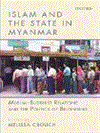

|
|
|
|
|
| Publication |
New Delhi, Oxford University Press, 2016.
|
| Description |
xix, 345p.hbk
|
| Standard Number |
9780199461202
|
|
|
|
|
|
|
|
|
|
|
|
Copies: C:1/I:0,R:0,Q:0
Circulation
| Accession# | Call# | Current Location | Status | Policy | Location |
| 058623 | 322.1/CRO 058623 | Main | On Shelf | General | |
|
|
|
|
| 14 |
ID:
114536
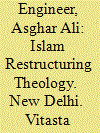

|
|
|
|
|
| Publication |
New Delhi, Vitasta Publishing Pvt. Ltd., 2012.
|
| Description |
ix, 225p.Hbk
|
| Standard Number |
9789380828640
|
|
|
|
|
|
|
|
|
|
|
|
Copies: C:1/I:0,R:0,Q:0
Circulation
| Accession# | Call# | Current Location | Status | Policy | Location |
| 056776 | 297.5/ENG 056776 | Main | On Shelf | General | |
|
|
|
|
| 15 |
ID:
157348
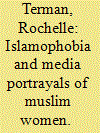

|
|
|
|
|
| Summary/Abstract |
This article examines portrayals of Muslim women in US news media. I test two hypotheses derived from theories of gendered orientalism. First, US news coverage of women abroad is driven by confirmation bias. Journalists are more likely to report on women living in Muslim and Middle Eastern countries if their rights are violated but report on women in other societies when their rights are respected. Second, stories about Muslim women emphasize the theme of women's rights violations and gender inequality, even for countries with relatively good records of women's rights. Stories about non-Muslim women, on the other hand, emphasize other topics. I test these hypotheses on data from thirty-five years of New York Times and Washington Post reporting using a structural topic model along with statistical analysis. The results suggest that US news media propagate the perception that Muslims are distinctly sexist. This, in turn, may shape public attitudes toward Muslims, as well as influence policies that involve Muslims at home and abroad.
|
|
|
|
|
|
|
|
|
|
|
|
|
|
|
|
| 16 |
ID:
105011
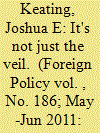

|
|
|
| 17 |
ID:
178864
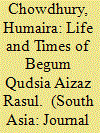

|
|
|
|
|
| Summary/Abstract |
This paper examines the life and times of a remarkable twentieth-century figure, Begum Qudsia Aizaz Rasul (1908–2001), the first and only Muslim woman in independent India’s Constituent Assembly which drafted the country’s Constitution. In doing so, it critically engages with the genre of autobiographical writing—the limits it imposed and the particular vantage points it offered. By drawing upon Begum Rasul’s private papers, her autobiography and her speeches in the Constituent Assembly debates from 1946 to 1950, this paper unpacks the ways in which she sought to negotiate her multiple and intersecting identities of class, gender and religious background. Her acts of self-fashioning provide critical insights into how Muslim women negotiated their identities in post-colonial India often in resistance to, and conformity with, the national status quo.
|
|
|
|
|
|
|
|
|
|
|
|
|
|
|
|
| 18 |
ID:
174911
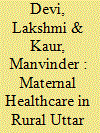

|
|
|
|
|
| Summary/Abstract |
This field-based study evaluates the impact of free maternal healthcare services on the healthcare-seeking behaviour of 125 pregnant women in six villages of Uttar Pradesh. The 87 Muslim and 38 non-Muslim women participating in this project appreciated the antenatal and postnatal care processes on offer. Yet, various government efforts to encourage women to give birth in government hospitals to comply with international benchmarks on reduction of maternal mortality rates were unsuccessful. The study explores the various reasons for the strategic choices made by these rural women, who continue to favour home-based delivery. The findings raise policy implications about how state financing of maternal healthcare provisions in India is to be delivered, in the best possible manner, at local levels.
|
|
|
|
|
|
|
|
|
|
|
|
|
|
|
|
| 19 |
ID:
149222
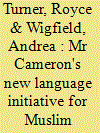

|
|
|
|
|
| Summary/Abstract |
As the government announces a programme to teach Muslim women to speak English, this article examines how such a policy can be implemented successfully, arguing that lessons can be drawn from both academic research, especially that carried out with Muslim women themselves, and previous successful policy application. It focuses on two projects carried out in the recent past for the Learning and Skills Council (LSC) and Jobcentre Plus, and outlines the key factors that led to their success. The LSC project involved one of the largest in-depth surveys of Muslim women's attitudes towards work, and their views on life in Britain, that has ever been undertaken. The Jobcentre Plus project was a highly successful and innovative employment training initiative for ethnic minority women piloted in Sheffield, the very kind of ‘targeted’ approach that Mr Cameron has claimed his government's new language initiative will be.
|
|
|
|
|
|
|
|
|
|
|
|
|
|
|
|
| 20 |
ID:
167641
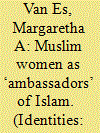

|
|
|
|
|
| Summary/Abstract |
This article explores the efforts of Dutch Muslim women who try to break the ‘oppressed Muslim woman’ stereotype by monitoring their own behaviour in everyday interactions with members of the non-Muslim ethnic majority. In representing themselves as modern and emancipated, they try to change the dominant image of Muslim women in Dutch society, and thus also that of Islam. Based on interviews and archival material, I demonstrate that initially this strategy was mostly adopted by Dutch converts to Islam, and later also by ‘born’ Muslim women. Why do more and more Muslim women turn themselves into ‘ambassadors’ of Islam? And what are the costs of this form of self-essentialization? This article demonstrates the usefulness of studying self-representations of minority groups in the light of existing stereotypes, arguing that Muslim women’s self-representations should be seen as part of a politics of belonging.
|
|
|
|
|
|
|
|
|
|
|
|
|
|
|
|
|
|
|
|
|